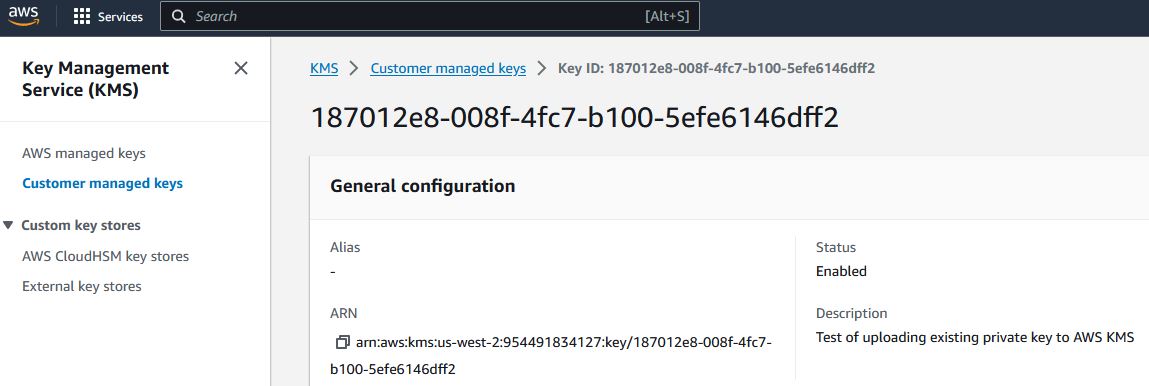|
|
(VBScript) Create CAdES p7m using AWS KMS to Sign in the Cloud
Demonstrates how to create a CAdES p7m, using AWS KMS. The signing of the hash happens in the Cloud on AWS KMS. Everything else regarding the creation of CAdES happens locally within Chilkat.
Note: This example requires Chilkat v9.5.0.96 or greater.
Dim fso, outFile
Set fso = CreateObject("Scripting.FileSystemObject")
'Create a Unicode (utf-16) output text file.
Set outFile = fso.CreateTextFile("output.txt", True, True)
' This example assumes the Chilkat API to have been previously unlocked.
' See Global Unlock Sample for sample code.
' Load the certificate used for signing. The certificate's private key is stored in AWS KMS
' However, we still need the certificate locally (without private key).
' For versions of Chilkat < 10.0.0, use CreateObject("Chilkat_9_5_0.Cert")
set cert = CreateObject("Chilkat.Cert")
success = cert.LoadFromFile("qa_data/certs/myCert.cer")
If (success = 0) Then
outFile.WriteLine(cert.LastErrorText)
WScript.Quit
End If
' Here's a screenshot showing the key ID of a private key in AWS KMS:
 ' To sign using AWS KMS,
' add the following lines of code to specify your AWS authentication credentials,
' and the ID of the KMS private key.
' For versions of Chilkat < 10.0.0, use CreateObject("Chilkat_9_5_0.JsonObject")
set jsonAwsKms = CreateObject("Chilkat.JsonObject")
' Set the "service" equal to "aws_kms" to tell Chilkat to use AWS KMS for signing.
success = jsonAwsKms.UpdateString("service","aws_kms")
success = jsonAwsKms.UpdateString("access_key","ACCESS_KEY")
success = jsonAwsKms.UpdateString("secret_key","SECRET_KEY")
' Make sure to specify the correct region for your case.
success = jsonAwsKms.UpdateString("region","us-west-2")
' In the above screenshot, our key ID is "187012e8-008f-4fc7-b100-5efe6146dff2". You will use your key ID.
success = jsonAwsKms.UpdateString("key_id","187012e8-008f-4fc7-b100-5efe6146dff2")
success = cert.SetCloudSigner(jsonAwsKms)
' For versions of Chilkat < 10.0.0, use CreateObject("Chilkat_9_5_0.Crypt2")
set crypt = CreateObject("Chilkat.Crypt2")
success = crypt.SetSigningCert(cert)
If (success = 0) Then
outFile.WriteLine(crypt.LastErrorText)
WScript.Quit
End If
' The CadesEnabled property applies to all methods that create PKCS7 signatures.
' To create a CAdES-BES signature, set this property equal to true.
crypt.CadesEnabled = 1
crypt.HashAlgorithm = "sha256"
' For versions of Chilkat < 10.0.0, use CreateObject("Chilkat_9_5_0.JsonObject")
set signedAttrs = CreateObject("Chilkat.JsonObject")
success = signedAttrs.UpdateInt("contentType",1)
success = signedAttrs.UpdateInt("signingTime",1)
success = signedAttrs.UpdateInt("messageDigest",1)
success = signedAttrs.UpdateInt("signingCertificateV2",1)
crypt.SigningAttributes = signedAttrs.Emit()
' You can sign any type of file..
inputXmlPath = "qa_data/e-Invoice.xml"
outputP7mPath = "qa_output/signed.p7m"
' Create the CAdES-BES attached signature, which contains the original data.
' Chilkat will build the .p7m locally, but will (internally) use ARSS
' to do the RSA signing remotely.
success = crypt.CreateP7M(inputXmlPath,outputP7mPath)
If (success = 0) Then
outFile.WriteLine(crypt.LastErrorText)
WScript.Quit
End If
outFile.WriteLine("Success.")
outFile.Close
' To sign using AWS KMS,
' add the following lines of code to specify your AWS authentication credentials,
' and the ID of the KMS private key.
' For versions of Chilkat < 10.0.0, use CreateObject("Chilkat_9_5_0.JsonObject")
set jsonAwsKms = CreateObject("Chilkat.JsonObject")
' Set the "service" equal to "aws_kms" to tell Chilkat to use AWS KMS for signing.
success = jsonAwsKms.UpdateString("service","aws_kms")
success = jsonAwsKms.UpdateString("access_key","ACCESS_KEY")
success = jsonAwsKms.UpdateString("secret_key","SECRET_KEY")
' Make sure to specify the correct region for your case.
success = jsonAwsKms.UpdateString("region","us-west-2")
' In the above screenshot, our key ID is "187012e8-008f-4fc7-b100-5efe6146dff2". You will use your key ID.
success = jsonAwsKms.UpdateString("key_id","187012e8-008f-4fc7-b100-5efe6146dff2")
success = cert.SetCloudSigner(jsonAwsKms)
' For versions of Chilkat < 10.0.0, use CreateObject("Chilkat_9_5_0.Crypt2")
set crypt = CreateObject("Chilkat.Crypt2")
success = crypt.SetSigningCert(cert)
If (success = 0) Then
outFile.WriteLine(crypt.LastErrorText)
WScript.Quit
End If
' The CadesEnabled property applies to all methods that create PKCS7 signatures.
' To create a CAdES-BES signature, set this property equal to true.
crypt.CadesEnabled = 1
crypt.HashAlgorithm = "sha256"
' For versions of Chilkat < 10.0.0, use CreateObject("Chilkat_9_5_0.JsonObject")
set signedAttrs = CreateObject("Chilkat.JsonObject")
success = signedAttrs.UpdateInt("contentType",1)
success = signedAttrs.UpdateInt("signingTime",1)
success = signedAttrs.UpdateInt("messageDigest",1)
success = signedAttrs.UpdateInt("signingCertificateV2",1)
crypt.SigningAttributes = signedAttrs.Emit()
' You can sign any type of file..
inputXmlPath = "qa_data/e-Invoice.xml"
outputP7mPath = "qa_output/signed.p7m"
' Create the CAdES-BES attached signature, which contains the original data.
' Chilkat will build the .p7m locally, but will (internally) use ARSS
' to do the RSA signing remotely.
success = crypt.CreateP7M(inputXmlPath,outputP7mPath)
If (success = 0) Then
outFile.WriteLine(crypt.LastErrorText)
WScript.Quit
End If
outFile.WriteLine("Success.")
outFile.Close
|

